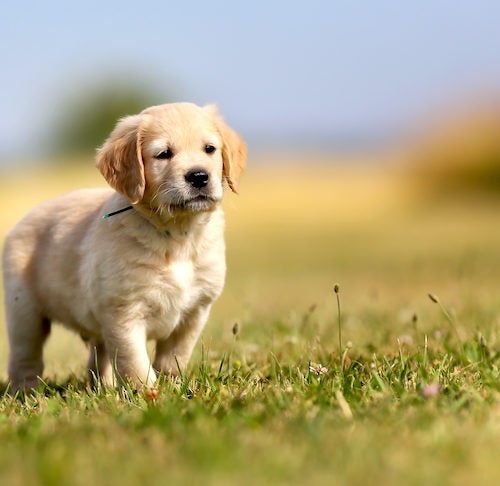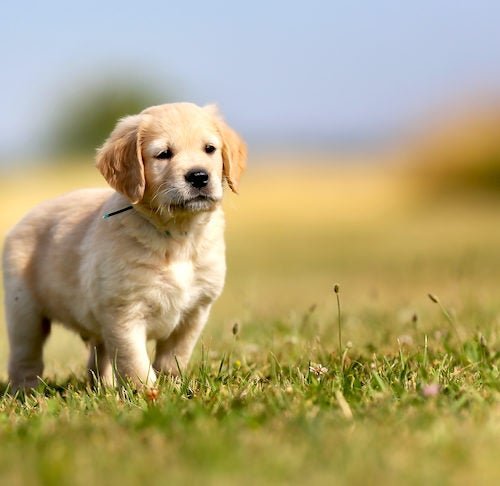When do golden retriever puppies get easier? If you’ve just welcomed one into your family, you might be wondering when the puppy chaos will settle down. Well, fear not, because I’ve got all the puppy scoop for you! Golden retriever puppies are known for their boundless energy and mischievous nature, but don’t worry, there’s light at the end of the tunnel.
As your golden retriever puppy grows, you’ll start to see some positive changes in their behavior. Around the age of four to six months, they enter a developmental stage where they become more receptive to training and start to understand basic commands. This is the time when things start to get a little easier.
By the time your golden retriever puppy reaches one year of age, you’ll likely notice a significant improvement in their behavior. They will have more self-control, be more attentive, and have a better grasp of what is expected of them. Don’t get me wrong, puppies are still puppies, but they’ll be easier to manage and train than when they were younger.
So, if you’re asking yourself when golden retriever puppies get easier, hang in there! With time, patience, and consistent training, you’ll soon find that your little ball of energy transforms into a well-behaved and lovable companion. Now let’s dive into the journey of raising a golden retriever puppy and discover what to expect along the way. Are you ready? Let’s go!

When Do Golden Retriever Puppies Get Easier?
Golden retriever puppies are adorable furballs that bring immense joy and love to our lives. However, they can also be quite a handful, especially for first-time dog owners. Many new puppy parents wonder when their golden retriever puppies will become easier to handle and train. In this article, we will explore the different stages of a golden retriever puppy’s development and provide insights on when you can expect them to become easier.
The First Few Weeks: The Early Challenges
During the first few weeks of a golden retriever puppy’s life, they are entirely dependent on their mother for nourishment and care. They spend their time nursing, sleeping, and growing. At around three weeks, their eyes and ears begin to open, and they become more aware of their surroundings. However, during this stage, they are still quite helpless and need constant care and attention.
As the weeks go by, the puppies start gaining mobility and begin teething, which can result in discomfort and a strong urge to chew. This phase can be challenging for both the puppy and the owner, as they may be tempted to chew on furniture, shoes, or anything within their reach. Patience and consistency are key during this period, as it helps establish boundaries and redirects their chewing behavior to appropriate toys.
The Adolescence Stage: The Turbulent Years
Between the ages of four to ten months, golden retriever puppies enter their adolescence stage. This is a crucial period for their growth and development, but it can also be a challenging time for owners. During adolescence, puppies experience hormonal changes that lead to increased independence, exploration, and testing of boundaries.
At this stage, golden retriever puppies may exhibit behaviors like chewing, digging, disobedience, and even occasional aggression. It is essential not to lose hope or become frustrated during this phase, as it is a natural part of their development. Consistent training, positive reinforcement, and socialization will help navigate through this turbulent period and set the foundation for a well-behaved and easier-to-handle adult golden retriever.
Adulting: When It Gets Easier
The golden retriever puppy’s journey through adolescence typically lasts until they reach one to two years of age. With time, patience, and consistent training, you will notice a significant improvement in their behavior, and they will become easier to manage. Adult golden retrievers are typically more settled, well-mannered, and less demanding than their younger counterparts.
By the time they reach adulthood, golden retrievers have usually mastered basic commands, house training, and have calmer energy levels. They have also developed a deeper bond with their owners. However, it is important to note that each dog is unique, and some golden retrievers may take longer to mature and settle into a more relaxed and well-behaved state.
Tips for Making Puppyhood Easier
Establish a Routine
Creating a consistent daily routine for your golden retriever puppy can help them feel secure and understand what is expected of them. This routine should include regular meal times, potty breaks, exercise, training sessions, and playtime. A structured routine will expedite the training process and make puppyhood more manageable.
Provide Adequate Socialization
Socialization is crucial for golden retriever puppies to become well-adjusted and sociable adults. Expose them to various people, animals, environments, and experiences from an early age. Encourage positive interactions and reward good behavior. This will help them develop into confident and friendly dogs.
Enroll in Puppy Classes
Puppy classes or obedience training programs are beneficial for both the puppy and the owner. These classes offer a structured environment where puppies can learn essential commands, proper behavior, and interact with other dogs. Trainers can provide guidance, address specific challenges, and offer valuable tips to make puppyhood easier.
Exercise and Mental Stimulation
Golden retrievers are an active breed, and providing them with ample physical exercise and mental stimulation is essential. Regular walks, play sessions, and interactive toys can help burn off excess energy and prevent destructive behavior. Mental stimulation, such as puzzle toys or training games, keeps their minds engaged and prevents boredom.
Remember, every dog’s journey is unique, and the timeline for when golden retriever puppies get easier can vary. However, with love, patience, and consistent training, you will witness your lovable golden retriever puppy turn into a well-behaved and easier-to-handle adult companion. Enjoy the journey and embrace the process of watching them grow and mature into wonderful dogs.
Key Takeaways: When Do Golden Retriever Puppies Get Easier?
- Golden Retriever puppies start to get easier around 4 to 6 months old.
- At this age, they begin to understand basic commands and potty training becomes more consistent.
- They become less mouthy and their biting behavior improves with proper training.
- As they approach 1 year old, their energy levels start to level out, making them easier to handle.
- Consistent training, exercise, and socialization play a big role in making Golden Retriever puppies easier to manage.
Frequently Asked Questions
Are you struggling with your golden retriever puppy? Here are some common questions about when golden retriever puppies get easier:
1. At what age do golden retriever puppies start to become easier to handle?
Golden retriever puppies typically start to become easier to handle once they reach six to nine months of age. At this stage, they have gone through the teething phase, have better bladder control, and are more physically and mentally mature. They have also learned basic obedience commands and have a better understanding of what is expected of them.
However, it is important to note that every puppy is different, and some may progress faster or slower than others. It’s important to continue training and providing consistent guidance to ensure a well-behaved adult golden retriever.
2. What can I do to make the training process easier for my golden retriever puppy?
To make the training process easier for your golden retriever puppy, consistency is key. Establish a daily routine that includes regular feeding times, potty breaks, and training sessions. Use positive reinforcement techniques such as treats, praise, and rewards to encourage good behavior and discourage unwanted habits.
Additionally, provide mental and physical stimulation through interactive toys, puzzle games, and regular exercise. This will help to keep your puppy engaged and prevent them from becoming bored or restless, which can lead to behavior problems. Remember to be patient and consistent, and seek guidance from a professional dog trainer if you need additional support.
3. How long does the puppy biting phase last?
The puppy biting phase, also known as teething, can last anywhere from a few weeks to a few months. It usually begins around three to four months of age and gradually decreases as the puppy’s adult teeth come in. During this phase, puppies explore the world through their mouths and may nip or chew on everything, including your hands, feet, and furniture.
To help manage puppy biting, provide appropriate chew toys and redirect their attention whenever they attempt to bite you. You can also teach them bite inhibition by yelping or saying “ouch” in a high-pitched tone whenever they bite too hard, mimicking the response of a littermate. As they progress through teething, their adult teeth will replace their baby teeth, and the biting behavior should naturally decrease.
4. When will my golden retriever puppy start to sleep through the night?
Your golden retriever puppy will typically start to sleep through the night between four to six months of age. During the first few months, puppies may need to go outside to relieve themselves in the middle of the night. However, as they develop better bladder control and their sleeping patterns become more established, they will gradually be able to hold their bladder throughout the night.
To encourage a good sleep routine, establish a bedtime routine that includes a potty break before bedtime, a comfortable and safe sleeping area, and a winding-down period to help them relax. Avoid stimulating activities or feeding them too close to bedtime, as this can disrupt their sleep. Remember to be patient during this process, as each puppy develops at their own pace.
5. When will my golden retriever puppy become more independent?
Golden retriever puppies usually start to become more independent as they enter adolescence, which is around six to twelve months of age. During this period, they may show more signs of testing boundaries and asserting their independence. They may also become more interested in exploring their surroundings, both physically and mentally.
To foster healthy independence, continue to provide a secure and structured environment while gradually allowing your puppy more freedom and responsibility. Offer them opportunities to make choices within safe boundaries, such as selecting their favorite toy or deciding which direction to walk during a supervised outing. By gradually increasing their independence, you can help them develop into well-rounded adult golden retrievers.

Golden Retriever Puppy First Week Home – Professional Dog Training Tips
Summary
Golden Retriever puppies start getting easier around 4 to 6 months old when they begin to mature. At this age, they become more independent, have better bladder control, and start understanding commands. However, they are still playful and require continued training and socialization.
As the puppies grow older, their energy levels decrease, and they become easier to handle. At around 1 to 2 years old, they start behaving more like adult dogs and are generally well-adjusted. Remember, every puppy is different, so be patient and consistent with their training to make the experience smoother for both of you.
